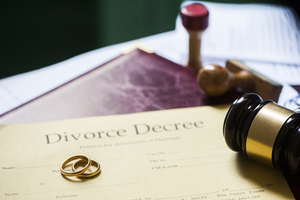Estate Planning During a Divorce
Marriage can be wonderful, but the fact is a significant number of today’s marriages end in divorce. For any divorcing couple, there are important things to consider about estate planning and several steps that can be taken to make sure you are not unintentionally leaving behind an undesirable situation.
While married, your estate plan is typically designed to provide for you, your spouse, and your heirs. Most plans name a surviving spouse to serve as trustee and executor, and that spouse typically also receives the bulk of the deceased’s assets. Family members of the surviving spouse may play important roles, and may be contingent beneficiaries. While these plans make perfect sense for a happily married couple, they usually do not fit the desires of a divorcing couple.
During a divorce, there are steps you should take to make sure your plan provides for your loved ones in the manner you intend. You may not realize it, but if you pass away before your divorce is finalized and you do not have a formal estate plan, your almost-ex-spouse is entitled to your half of community property and a share of your separate property. If you have a formal estate plan, the terms of that plan will apply until you make changes. Less obvious parts of your estate plan are life insurance policies and retirement accounts, which are controlled by beneficiary designations that most often name a spouse as the primary beneficiary.
If you no longer want your almost-ex-spouse to share in your estate, you must either create a formal estate plan or amend your existing plan. You should also name new beneficiaries for your life insurance and certain retirement accounts since, unless and until you change the designations, your spouse will receive those benefits.
If you are divorcing and have minor children, but do not have a trust, we would strongly urge you to consult an attorney and create one. Having a trust will give directives about the children’s custody in the event of your disability or death. You can also manage the transfer of assets to minor children by designating someone who will control money left to them, thereby avoiding a court guardianship procedure.
Be aware of assuming a prenuptial agreement will avoid these issues. Although a “prenup” may limit the obligation to provide for a surviving spouse upon death, it likely does not limit one party from voluntarily giving more to the spouse than required. Moreover, these agreements frequently do not address the period when a divorce is pending. State laws are often unhelpful as most do not address the impact of divorce until the divorce process is finalized. Thus, if your existing estate plan is more generous than you would want to be toward your almost-ex-spouse, you should make changes to that plan during the divorce process.
For more information and to discuss options about making sure your estate plan reflects your wishes and intentions, contact Kling Law Offices today for a free consultation so you can have the peace of mind you deserve.

